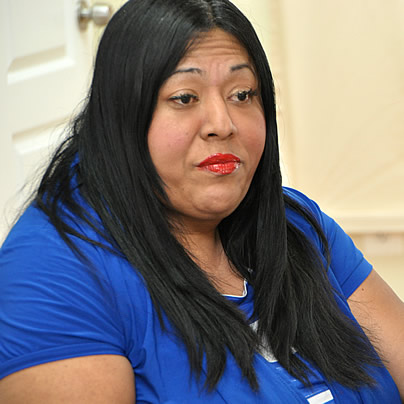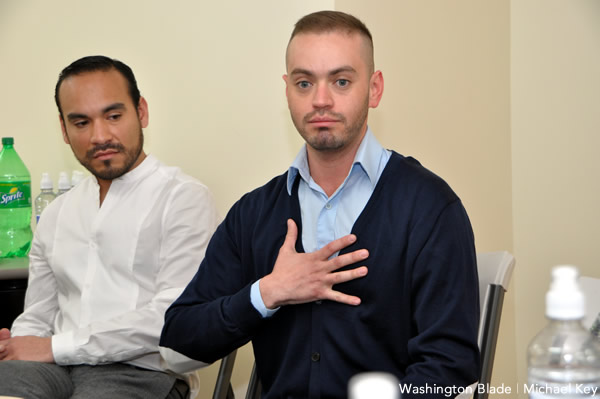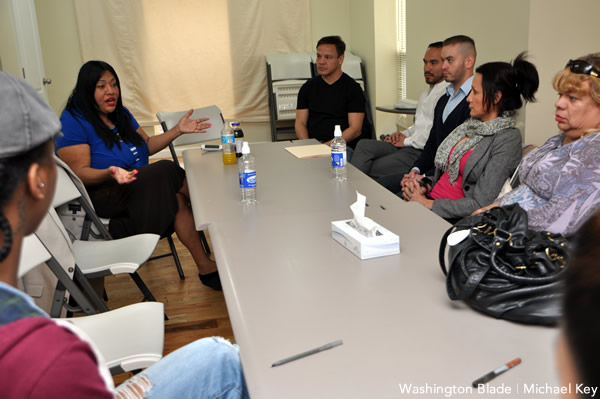Local
Casa Ruby seeks to expand jobs program
Dozens of clients attend employment classes, workshops each month

D.C. resident Lovely Allen worked at a local Safeway when she was a teenager, but she complained the supermarket’s managers did not provide her co-workers with any sensitivity training.
“They called me he and stuff like that,” Allen, 22, said while at Casa Ruby on Georgia Avenue in Northwest Washington on Monday. “It’s uncomfortable when you’re trying to work somewhere and someone’s referring to you as something that you don’t agree with and you don’t identify as.”
Allen is among the nearly dozen people enrolled in Casa Ruby’s job placement and training classes with whom the Washington Blade spoke on Monday.
The Latino LGBT community center offers a variety of vocational courses that include teaching clients how to become medical technicians who can administer HIV, hepatitis and glucose tests to patients.
Eduardo Carcamo works with Casa Ruby clients who want to become make-up artists, while designer Felix Montes has offered to instruct those interested in entering the fashion industry. Interior designer Enrique Coronado, who studied in Spain, also works with Casa Ruby clients.
The classes typically last two months, and participants receive a certificate from the instructor and from Casa Ruby upon completion.
More than 60 people graduated from the latest medical technician class that ended in December. A dozen clients attended Casa Ruby’s latest make-up artistry course, while roughly 30 participants take part in job consulting and skills development workshops each month.
Both Montes and Coronado reached out to Casa Ruby for job placement and other services before they offered to work with clients.
“It is an environment where people are welcome,” Casa Ruby CEO Ruby Corado said. “There are schools out there where unfortunately people don’t feel welcome.”
D.C. resident Ismael Delgado, who is originally from Paraguay, is among those who graduated from the make-up artistry class last December.
He told the Blade he wanted to enter cosmotology school, but could not afford the $25,000 tuition.
“They are very expensive,” Delgado said.
Teri Williams enrolled in Casa Ruby’s program after she received a referral through Project Empowerment, the city’s jobs training program for transgender Washingtonians.
“My education level is not really where it should be for my age because I was doing other things when I was coming up,” the D.C. resident who just turned 50 said. “The thing is now I need to be able to sustain my life and I need financial assistance, which I want to provide for myself. I honestly want to work.”
Montes, who is originally from Puerto Rico, said he is working with Casa Ruby because he wants to help other people find work who are unable to afford expensive job training courses.
“Everyone has talent,” he said. “Nobody can say that they do not have a talent. It is a question of what you’re looking for, what you like to do and your career will be what you want it to be.”
Statistics continue to show Latinos and other underrepresented groups within the LGBT community remain particularly vulnerable to employment discrimination.
A 2011 study from the National Center for Transgender Equality and the National Gay and Lesbian Task Force found trans people are nearly twice as likely to be unemployed than the general population. The jobless rate among trans people of color is four times higher than the national average.
The survey reported 97 percent of respondents experienced harassment or mistreatment while at work. Nearly half of them said a prospective employer did not hire them because they were transgender. And 26 percent of respondents indicated they lost their jobs because of their gender identity and expression.
NCTE and the Task Force further noted 15 percent of respondents earned less than $10,000 a year. This figure among blacks who took part in the survey jumped to 35 percent.
The D.C. Department of Employment Services in 2011 launched Project Empowerment as a way to help reduce unemployment and poverty rates among trans Washingtonians.
More than 70 people have graduated from the program since its inception, but those with whom the Blade spoke at Casa Ruby said city officials can do more to help trans people and D.C. residents who are looking for work.
“Project Empowerment needs to be a little longer,” Williams said. “Once you get used to working and you’re changing your ways, you’re right back out there if you don’t get your job right away.”
Allen said she had tried to enroll in Project Empowerment a couple of months ago, but she said it was full. She is scheduled to start with the program “in a few days” after she and Corado reached out to Mayor Vincent Gray.
“I do feel there’s a lack of jobs here for the gay and transgender people,” Allen said. “A lot of times I guess they [prospective employers] worry about how it makes their places look if you hire trans people or Latinas. If I can work then why shouldn’t I be able to?”
Casa Ruby has not received any grant money from the D.C. Department of Employment Services to fund the jobs program since it officially opened last June. Corado said she is planning to reach out to private donors, foundations, non-profit organizations and other groups that may want to invest in them.
Meanwhile, participants hope city officials work to address some of the underlying issues they maintain prevent LGBT Washingtonians from gaining employment.
“Here there is a lot of discrimination,” Coronado said. “I have a resume with my studies, with specific jobs but I have a Latino last name — not an American last name.”
He added the language barrier and a lack of knowledge of the benefits the city offers to those who are seeking employment and the rights they have as D.C residents are among the additional barriers.
Delgado said he would like to see the Gray administration do more to address these issues.
“We are preparing a group of people that will empower themselves, others,” Larry Villegas of Casa Ruby added as he discussed a previous jobs program for people with HIV/AIDS. Companies were able to call and look at resumes when they needed to hire someone. “We need to fill that gap from the officials to say OK we need to revamp that program that could hire anybody that is skilled.”
Allen and other Casa Ruby clients acknowledged it is their responsibility to take the initiative to find a job. They added discrimination and other barriers make this task exceedingly difficult.
“No one is going to go home and change from the woman that they are and put on a fitted hat and a pair of tennis shoes to get a job,” Allen said. “I don’t think anybody should have to do that. I don’t think you should have to alter your appearance or who you are to gain employment.”
Maryland
Md. Commission on LGBTQIA+ Affairs released updated student recommendations
LGBTQ students report higher rates of bullying, suicide

The Maryland Commission on LGBTQIA+ Affairs has released updated recommendations on how the state’s schools can support LGBTQ students.
The updated 16-page document outlines eight “actionable recommendations” for Maryland schools, supplemented with data and links to additional resources. The recommendations are:
- Developing and passing a uniform statewide and comprehensive policy aimed at protecting “transgender, nonbinary, and gender expansive students” against discrimination. The recommendation lists minimum requirements for the policy to address: name, pronoun usage, and restroom access.
- Requiring all educators to receive training about the specific needs of LGBTQ students, by trained facilitators. The training’s “core competencies” include instruction on terminology, data, and support for students.
- Implementing LGBTQ-inclusive curricula and preventing book bans. The report highlights a “comprehensive sexual education curriculum” as specifically important in the overall education curriculum. It also states the curriculum will “provide all students with life-saving information about how to protect themselves and others in sexual and romantic situations.”
- Establishing Gender Sexuality Alliances “at all schools and in all grade levels.” This recommendation includes measures on how to adequately establish effective GSAs, such as campaign advertising, and official state resources that outline how to establish and maintain a GSA.
- Providing resources to students’ family members and supporters. This recommendation proposes partnering with local education agencies to provide “culturally responsive, LGBTQIA+ affirming family engagement initiatives.”
- Collecting statewide data on LGBTQ youth. The data on Maryland’s LGBTQ youth population is sparse and non-exhaustive, and this recommendation seeks to collect information to inform policy and programming across the state for LGBTQ youth.
- Hiring a full-time team at the Maryland Department of Education that focuses on LGBTQ student achievement. These employees would have specific duties that include “advising on local and state, and federal policy” as well as developing the LGBTQ curriculum, and organizing the data and family resources.
- Promoting and ensuring awareness of the 2024 guidelines to support LGBTQ students.
The commission has 21 members, with elections every year, and open volunteer positions. It was created in 2021 and amended in 2023 to add more members.
The Governor’s Office of Communication says the commission’s goal is “to serve LGBTQIA+ Marylanders by galvanizing community voices, researching and addressing challenges, and advocating for policies to advance equity and inclusion.”
The commission is tasked with coming up with yearly recommendations. This year’s aim “to ensure that every child can learn in a safe, inclusive, and supportive environment.”
The Human Rights Campaign’s most recent report on LGBTQ youth revealed that 46.1 percent of LGBTQ youth felt unsafe in some school settings. Those numbers are higher for transgender students, with 54.9 percent of them saying they feel unsafe in school.
Maryland’s High School Youth Risk Behavior Survey reveals a disparity in mental health issues and concerns among students who identify as LGBTQ, compared to those who are heterosexual. LGBTQ students report higher rates of bullying, feelings of hopelessness, and suicidal thoughts. Nearly 36 percent of LGBTQ students report they have a suicide plan, and 26.7 percent of respondents say they have attempted to die by suicide.
The commission’s recommendations seek to combat the mental health crisis among the state’s LGBTQ students. They are also a call for local and state governments to work towards implementing them.
Virginia
Va. lawmakers consider partial restoration of Ryan White funds
State Department of Health in 2025 cut $20 million from Part B program

The Virginia General Assembly is considering the partial restoration of HIV funding that the state’s Department of Health cut last year.
The Department of Health in 2025 cut $20 million — or 67 percent of total funding — from the Ryan White Part B program.
The funding cuts started with the Trump-Vance administration passing budget cuts to federal HIV screening and protection programs. Rebate issues between the Virginia Department of Health and the company that provides HIV medications began.
Advocates say the funding cuts have disproportionately impacted lower-income people.
The Ryan White HIV/AIDS Program, a federal program started in 1990, provides medical services, public education, and essential services. Part B offers 21 services, seven of which remained funded after the budget cuts.
Equality Virginia notes “in 2025, a 67 percent reduction severely destabilized HIV services across the commonwealth.”
Virginia lawmakers have approved two bills — House Bill 30 and Senate Bill 30 — that would partially restore the funding. The Ryan White cuts remain a concern among community members.
Both chambers of the General Assembly must review their proposed changes before lawmakers can adopt the bills.
“While these amendments aren’t a full restoration of what community-based organizations lost, this marks a critical step toward stabilizing care for thousands of Virginians living with HIV,” said Equality Virginia Executive Director Narissa Rahaman. “Equality Virginia plans to continue their contact with lawmakers and delegates through the conference and up until the passing of the budget.”
“We appreciate lawmakers from both sides of the aisle who recognized the urgency of this moment and will work to ensure funding remains in the final version signed by the governor,” added Rahaman.
District of Columbia
D.C. Black Pride theme, performers announced at ‘Speakeasy’
Durand Bernarr to headline 2026 programming

The Center for Black Equity held its 2026 DC Black Pride Theme Reveal event at Union Stage on Monday. The evening, a “Speakeasy Happy Hour,” was hosted by Anthony Oakes and featured performances by Lolita Leopard and Keith Angelo. The Center for Black Equity organizes DC Black Pride.
Kenya Hutton, Center for Black Equity president and CEO, spoke following the performances by Leopard and Angelo. Hutton announced this year’s theme for DC Black Pride: “New Black Renaissance.”
Performers for 2026 DC Black Pride were announced to be Bang Garcon, Be Steadwell, Jay Columbus, Bennu Byrd, Rue Pratt and Akeem Woods.
Singer-songwriter Durand Bernarr was announced as the headliner for the 2026 festivities. Bernerr gave brief remarks through a video played on the screen at the stage.
DC Black Pride is scheduled for May 22-25. For more information on DC Black Pride, visit dcblackpride.org.



















